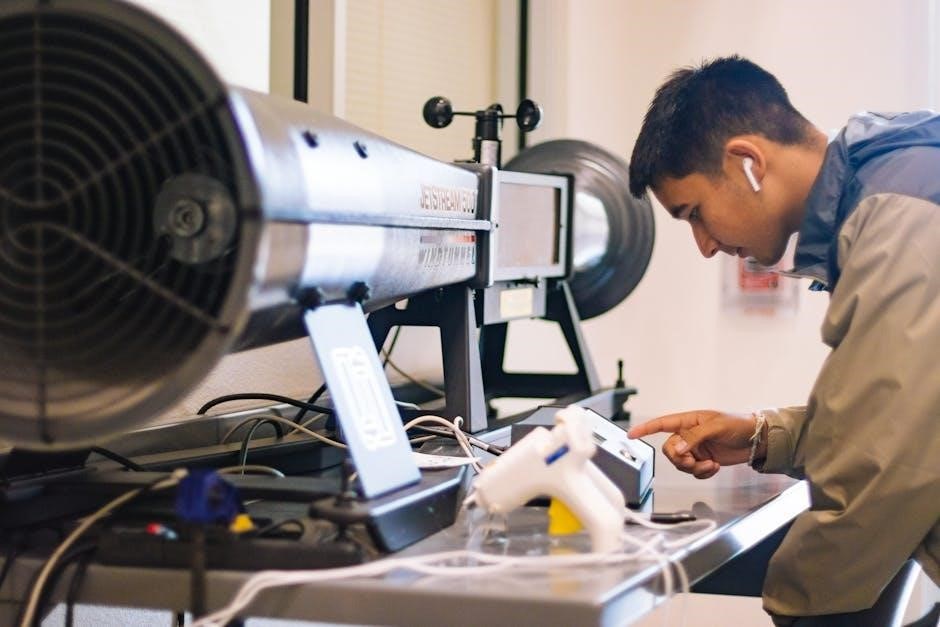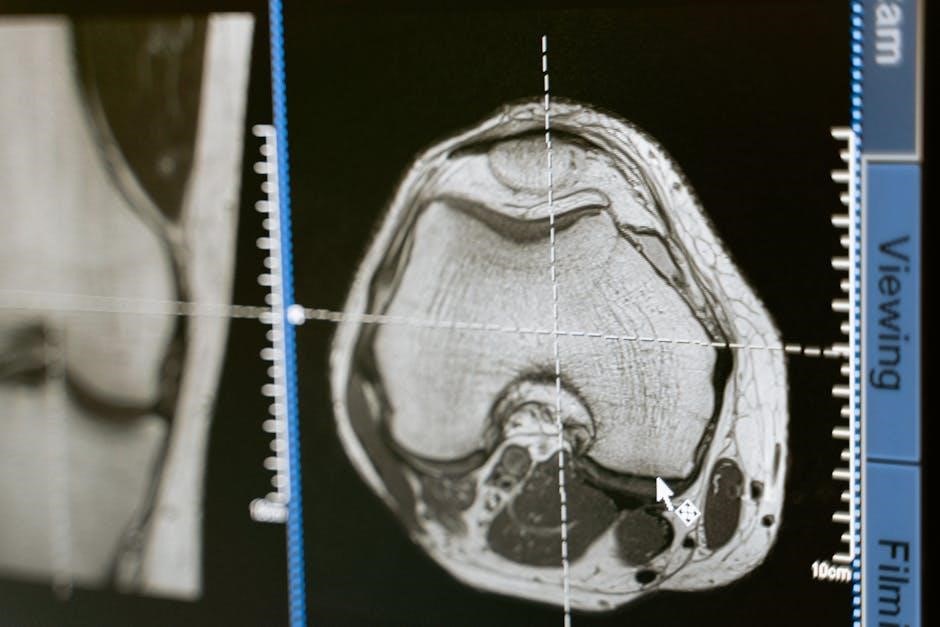This section introduces the MS Computer Science Entry Test MCQs PDF, a comprehensive resource designed to help applicants prepare for the admission exam. It outlines the test structure, covering English, Mathematics, and Computer Science sections, each weighted at 25%. The PDF includes sample questions, time management tips, and strategies for mastering core concepts like algorithms and data structures. It serves as a valuable tool for understanding the exam format and improving problem-solving skills efficiently within the two-hour duration, with no negative marking.
1.1 Overview of the MS Computer Science Program
The MS Computer Science program is a 30-credit, hands-on degree that covers the full lifecycle of software development, from design and testing to deployment and maintenance. Designed for students seeking advanced knowledge, it offers a flexible, online learning option. The curriculum focuses on core areas like algorithms, data structures, and computer systems, preparing graduates for cutting-edge roles in tech. The program is ideal for those aiming to expand their expertise in computer science.
1.2 Importance of Entry Tests in Admission Processes
Entry tests play a crucial role in admission processes for MS Computer Science programs, as they assess a candidate’s knowledge in English, Mathematics, and Computer Science. These tests help universities evaluate a student’s readiness for advanced studies and their ability to handle the program’s rigors. They also ensure a fair and standardized comparison of applicants, making them a key factor in admission decisions.
1.3 Structure of the MS Computer Science Entry Test
The MS Computer Science Entry Test is divided into three equally weighted sections: English, Mathematics, and Computer Science. Each section accounts for 25% of the total marks. The test is designed to assess a candidate’s proficiency in these areas, ensuring they meet the program’s academic standards. The structure is straightforward, with a two-hour duration and no negative marking, focusing on evaluating core knowledge and problem-solving abilities effectively.

Understanding the Test Format
The MS Computer Science Entry Test assesses skills in English, Mathematics, and Computer Science. It consists of three sections, each with a 25% weightage. The test is timed for two hours, with no negative marking, ensuring candidates demonstrate their knowledge and problem-solving abilities effectively within the allotted timeframe.
2.1 Sections of the Entry Test
The MS Computer Science Entry Test is divided into three distinct sections: English, Mathematics, and Computer Science, each carrying equal weightage of 25%. The English section assesses language proficiency, while Mathematics focuses on quantitative reasoning and problem-solving skills. The Computer Science section evaluates knowledge of algorithms, data structures, and core concepts. Together, these sections comprehensively gauge a candidate’s readiness for advanced studies in computer science, ensuring a holistic evaluation of their abilities.
2.2 Weightage Distribution of Each Section
The MS Computer Science Entry Test allocates equal weightage to each section, ensuring a balanced evaluation. English, Mathematics, and Computer Science each account for 25% of the total score. This distribution reflects the importance of both technical and language skills, providing a fair assessment of a candidate’s overall aptitude. The 25% weightage per section ensures that no single area disproportionately impacts the final result, promoting a well-rounded preparation strategy.
2.3 Time Allocation and Marking Scheme
The MS Computer Science Entry Test is a two-hour exam with no negative marking, allowing candidates to attempt all questions without penalty. The total marks are allocated based on the weightage of each section, with English, Mathematics, and Computer Science each contributing 25%. Candidates should allocate time strategically, spending approximately two minutes per question to ensure thorough attempts and some buffer for review. Proper time management is crucial for maximizing scores.

Preparation Strategies for the Entry Test
Develop an effective study plan, focusing on weak areas and utilizing past papers. Regular practice and review of core concepts are essential for success.
3.1 Effective Study Plan and Time Management
Create a structured study plan, dedicating specific time slots to each section—English, Mathematics, and Computer Science. Prioritize understanding core concepts over cramming. Allocate weekly time for reviewing past papers and sample tests to identify weak areas. Focus on consistent practice, ensuring regular breaks to maintain productivity. Use a timer during practice sessions to simulate test conditions and enhance time management skills effectively.
3.2 Utilizing Past Papers and Sample Tests
Past papers and sample tests are invaluable resources for familiarizing yourself with the exam format and question types. Regularly solving these helps improve time management, identifies weak areas, and refines problem-solving strategies. Reviewing results highlights strengths and gaps, enabling focused preparation. Accessible online, these materials provide real test simulations, ensuring readiness for the actual exam environment and boosting confidence in tackling challenging questions effectively.
3.3 Focusing on Weak Areas and Strengths
Identifying and addressing weak areas while leveraging strengths is crucial for effective preparation. Analyze past papers to pinpoint topics requiring improvement. Allocate more study time to these areas, using targeted resources like textbooks or online tools. Simultaneously, reinforce strengths to maintain high scores. This balanced approach ensures comprehensive preparation, enhancing overall performance and confidence for the entry test, ultimately increasing the likelihood of a successful outcome in the admission process.
Important Topics to Cover
Key topics include English grammar, vocabulary, and reading comprehension; Mathematics focusing on algebra, calculus, and quantitative reasoning; and Computer Science covering algorithms, data structures, and programming concepts.
4.1 English Section Topics
The English section assesses grammar, vocabulary, and comprehension. Topics include verb tenses, sentence structure, synonyms, antonyms, and reading passages. Applicants should practice MCQs on error detection, sentence completion, and paragraph understanding to enhance their language skills, ensuring proficiency for academic success in the MS program. Regular practice with sample tests improves speed and accuracy in this section.
4.2 Mathematics Section Topics
The mathematics section focuses on algebra, calculus, probability, and statistics. Topics include functions, limits, derivatives, and integrals. Additionally, it covers discrete mathematics, such as graph theory and combinatorics. Applicants should practice MCQs on numerical reasoning, logarithms, and problem-solving techniques. Regular review of mathematical concepts and solving past papers helps build confidence and improves problem-solving speed, ensuring readiness for the test.
4.3 Computer Science Section Topics
The computer science section covers algorithms, data structures, and programming concepts. Topics include sorting algorithms, tree structures, and object-oriented programming principles. It also addresses software engineering, operating systems, and database basics. Applicants should focus on understanding algorithm complexity and implementing data structures. Practice MCQs on these areas to enhance problem-solving skills and ensure a strong foundation for the exam.

Sample Papers and Practice Tests
Sample papers and practice tests are essential for familiarizing oneself with the exam format. They enhance problem-solving skills and time management, ensuring better exam readiness and confidence.
5.1 Benefits of Solving Sample Papers
Solving sample papers offers invaluable benefits for MS Computer Science entry test preparation. It helps candidates understand the test structure, question types, and difficulty levels. Regular practice improves time management, enhances problem-solving skills, and boosts confidence. Additionally, sample papers familiarize applicants with the exam format, allowing them to identify weak areas and focus on improvement. They also reduce test-day anxiety by simulating real exam conditions, ensuring better readiness and performance.
5.2 Availability of MS Computer Science Sample Tests
MS Computer Science sample tests are widely available online, offering applicants ample resources for preparation. Universities like Saint Louis University provide sample papers on their official portals, while platforms like [specific websites] offer downloadable PDFs. These tests cover sections such as English, Mathematics, and Computer Science, mirroring the actual exam format. Candidates can access these materials to practice and gain familiarity with the test structure and content, aiding in effective preparation.
5.3 Tips for Analyzing Practice Test Results
Analyzing practice test results is crucial for effective preparation. Review incorrect answers to identify weak areas and understand common mistakes. Focus on time management by assessing how long each section took. Track progress over multiple tests to measure improvement. Use the insights to refine study plans, targeting specific topics like algorithms or data structures. This systematic approach ensures focused revision and enhances overall performance in the actual MS Computer Science entry test.

Common Mistakes to Avoid
Avoid rushing through questions, neglecting instructions, and excessive guessing. Poor time management and failing to prioritize questions can lead to low scores. Neglecting proper revision and skipping difficult questions are additional pitfalls. Ensure thorough preparation and review to minimize errors and improve overall performance in the MS Computer Science entry test.
6.1 Time Management Errors
Time management errors are common during the MS Computer Science entry test. Many candidates rush through questions, leading to careless mistakes. Others spend too long on difficult problems, leaving insufficient time for simpler ones. To avoid this, practice time allocation strategies and prioritize questions based on difficulty. Allocate specific minutes per section and stick to your plan. Regular practice with sample papers can help improve pacing and reduce anxiety, ensuring efficient use of the two-hour duration. This approach minimizes errors and maximizes scores, as candidates can address all questions without running out of time. Proper time management is crucial for success.
6.2 Overlooking Key Concepts
Overlooking key concepts is a frequent mistake in the MS Computer Science entry test. Many candidates neglect to thoroughly review fundamental topics like algorithms, data structures, and software development. These areas are critical and often form the basis of multiple questions. To avoid this error, focus on building a strong foundation in core subjects and regularly revise essential concepts. Practice with past papers and sample tests can help identify and address these gaps, ensuring comprehensive preparation and avoiding costly oversights during the exam.
6.3 Neglecting Proper Revision
Neglecting proper revision is a common pitfall for MS Computer Science entry test candidates. Without regular review, even well-prepared students may forget essential concepts, leading to poor performance. The test covers a broad range of topics, including algorithms, data structures, and software engineering, making consistent revision crucial. Candidates should allocate dedicated time weekly to revisit and reinforce key areas, ensuring a strong grasp of fundamental principles before the exam. This practice helps maintain confidence and accuracy during the test.

Strategies for Success
Mastering core concepts, practicing regularly with sample papers, and building a strong foundation in computer science are key strategies for success in the MS entry test.
7.1 Building a Strong Foundation in Core Subjects
Building a strong foundation in core subjects like algorithms, data structures, and mathematics is crucial for success in the MS Computer Science entry test. Focus on understanding fundamental concepts thoroughly, as they form the basis of most test questions. Regular practice with sample papers helps reinforce these concepts and improves problem-solving skills. A solid grasp of these areas ensures confidence and accuracy during the exam.
7.2 Regular Practice and Revision
Regular practice and revision are essential for excelling in the MS Computer Science entry test. Consistent practice helps improve problem-solving skills and time management. Utilize past papers and sample tests to familiarize yourself with the exam format. Regular revision reinforces key concepts and reduces exam anxiety. Focus on identifying and improving weak areas to ensure a strong performance. Stay consistent and dedicated to achieve the best results.
7.3 Staying Updated with Test Patterns
Staying updated with the latest test patterns is crucial for success in the MS Computer Science entry test. Review the current exam format, including question types and weightage distribution. Analyze recent sample papers to understand trends and focus areas. Adapt your preparation strategy to align with any changes in the test structure. Regularly check official resources for updates to ensure your study plan remains relevant and effective. This proactive approach enhances your readiness for the exam.

Resources for Preparation
Key resources include sample papers, recommended textbooks, and online platforms. Utilize study groups and forums for collaborative learning. These tools enhance preparation and understanding of core concepts effectively.
8.1 Recommended Textbooks and Study Materials
8.2 Online Platforms and Tools
Online platforms like Coursera, edX, and LeetCode offer courses and practice materials tailored for MS Computer Science entry tests. Tools such as Quizlet provide flashcards for quick revision, while platforms like Codeforces and HackerRank offer coding challenges. These resources cover essential topics like algorithms, data structures, and software development. They also include mock tests and interactive exercises, helping candidates improve problem-solving skills and time management effectively. Utilizing these tools enhances preparation and boosts confidence for the exam.
8.3 Joining Study Groups or Forums
Joining study groups or forums connects applicants with peers, fostering collaborative learning and problem-solving. Platforms like Reddit, Quora, and specialized academic forums provide valuable insights, shared resources, and tips from experienced candidates. These communities discuss common challenges, share study materials, and offer advice on tackling difficult topics. Active participation can clarify doubts, enhance understanding, and build confidence, making these groups an invaluable part of the preparation process for the MS Computer Science entry test.

Test Day Tips
Ensure adequate rest, arrive early, and carry essential items. Stay calm, manage time wisely, and read instructions carefully. Avoid last-minute cramming and maintain focus throughout the test.
9.1 Preparing Mentally and Physically
Ensure proper rest and nutrition before the test to maintain energy levels. Engage in light physical activity to reduce stress and improve focus. Practice relaxation techniques like meditation or deep breathing to stay calm. Avoid last-minute cramming and review notes lightly to reinforce confidence. Stay hydrated and get adequate sleep to maintain mental clarity and physical well-being, ensuring you arrive at the test center feeling refreshed and prepared.
9.2 Reaching the Test Center Prepared
Arrive at the test center early to avoid last-minute stress. Carry essential items like your admission card, valid ID, and stationery. Ensure your devices are fully charged if allowed. Familiarize yourself with the venue beforehand to save time. Avoid bringing prohibited items like mobile phones or calculators. Reach with all necessary documents and materials to ensure smooth entry and a focused mindset for the exam.
9.3 Managing Stress During the Test
Stay calm by practicing deep breathing exercises to maintain focus. Skim through the paper to plan your approach, starting with easier questions to build confidence. Allocate time wisely for each section, avoiding overthinking. Read instructions carefully and manage your pace to prevent last-minute rush. Remember, the test has no negative marking, so attempt all questions to maximize your score. Stay composed and think clearly to achieve your best performance.

Post-Test Actions
Evaluate your performance by reviewing answers and identifying areas for improvement. Understand the next steps in the admission process, such as result announcements and potential interviews. Stay informed through official portals for updates on test results and further instructions.
10.1 Evaluating Performance
Evaluating performance after the MS Computer Science entry test involves analyzing strengths and weaknesses. Review your answers to identify accurate and incorrect responses, focusing on areas needing improvement. Utilize the provided answer key and explanations to understand where you went wrong. This step helps in refining your knowledge and strategies for future attempts or interviews, ensuring a more polished approach to the admission process.
10.2 Understanding the Next Steps in Admission
After the entry test, the next steps involve awaiting results and reviewing eligibility criteria. Candidates who meet the required scores are shortlisted for interviews or further evaluations. Stay informed through official portals and ensure all documents are ready for submission. Understanding these steps helps streamline the admission process and prepares candidates for potential interviews or additional assessments, ensuring a smooth transition toward securing a spot in the MS program.
10.3 Staying Informed About Results and Interviews
Candidates should regularly check the official university portal or email for entry test results and interview schedules. Results are typically announced within a few weeks, and shortlisted candidates receive interview invitations. Stay updated by visiting the official website and ensuring all communication channels are accessible. Timely follow-ups and preparedness for interviews are crucial to avoid missing important deadlines and opportunities in the admission process.

Frequently Asked Questions
General queries address test format, eligibility, and preparation resources. Clarifications on sections like English, Mathematics, and Computer Science are common. Applicants often seek guidance on result timelines and interview processes.
11.1 General Queries About the Test
Applicants often inquire about eligibility criteria, test format, and preparation resources. Common questions include the weightage of sections, time duration, and the types of questions asked. Many seek clarity on the syllabus, focusing on English, Mathematics, and Computer Science. Others ask about the importance of past papers and sample tests for effective preparation. Understanding the test structure and content is crucial for aspirants to devise a strategic study plan.
11.2 Clarifications on Test Format
The MS Computer Science entry test is divided into three equally weighted sections: English, Mathematics, and Computer Science, each contributing 25%. The test duration is two hours, with no negative marking. It assesses both foundational knowledge and problem-solving skills. Applicants can expect multiple-choice questions (MCQs) covering topics like algorithms, data structures, and quantitative reasoning. The format is designed to evaluate a candidate’s aptitude for advanced computer science studies and their ability to apply concepts effectively.
11.3 Common Concerns of Applicants
Applicants often worry about understanding the test format, managing time effectively, and tackling difficult questions. Many are concerned about their ability to handle quantitative reasoning and computer science-specific topics. Others seek clarity on weightage distribution and the types of questions asked. Ensuring adequate preparation and understanding the test structure can alleviate these concerns, helping applicants feel more confident and prepared for the exam.
The MS Computer Science Entry Test MCQs PDF is a valuable resource for applicants, aiding in understanding the test format and improving preparation. Best wishes for success!
12.1 Final Tips for Aspiring Applicants
Aspiring applicants should focus on building a strong foundation in core subjects, practice under timed conditions, and review past papers. Prioritize problem-solving skills, especially in algorithms and data structures. Stay updated on test patterns and manage time effectively during the exam. Utilize available resources like sample tests and study materials to enhance preparation. Maintain confidence, stay calm, and aim to attempt all questions within the two-hour duration. Best of luck!
12.2 Encouragement for Thorough Preparation
Thorough preparation is key to excelling in the MS Computer Science entry test. Dedicate time to understanding core concepts, especially in algorithms and data structures. Regularly practice with sample papers to improve problem-solving skills and time management. Stay focused, maintain a consistent study routine, and review past mistakes to refine your approach. Believe in your abilities, stay motivated, and give your best effort to secure a spot in the program.
12.3 Best Wishes for Success
Wishing you the best of luck for your MS Computer Science entry test! May your hard work and dedication yield outstanding results. Stay confident, approach the test with a clear mind, and showcase your skills effectively. This is a significant step toward a promising future in computer science. Embrace the challenge, perform your best, and look forward to the exciting opportunities ahead. Good luck!


